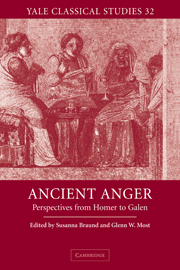Book contents
- Frontmatter
- Contents
- Notes on contributors
- Acknowledgments
- List of abbreviations
- Introduction
- Chapter 1 Ethics, ethology, terminology: Iliadic anger and the cross-cultural study of emotion
- Chapter 2 Anger and pity in Homer's Iliad
- Chapter 3 Angry bees, wasps, and jurors: the symbolic politics of ὀργή in Athens
- Chapter 4 Aristotle on anger and the emotions: the strategies of status
- Chapter 5 The rage of women
- Chapter 6 Thumos as masculine ideal and social pathology in ancient Greek magical spells
- Chapter 7 Anger and gender in Chariton's Chaereas and Callirhoe
- Chapter 8 “Your mother nursed you with bile”: anger in babies and small children
- Chapter 9 Reactive and objective attitudes: anger in Virgil's Aeneid and Hellenistic philosophy
- Chapter 10 The angry poet and the angry gods: problems of theodicy in Lucan's epic of defeat
- Chapter 11 An ABC of epic ira: anger, beasts, and cannibalism
- References
- Index of passages cited
- Index of proper names
- Index of topics
Chapter 3 - Angry bees, wasps, and jurors: the symbolic politics of ὀργή in Athens
Published online by Cambridge University Press: 22 September 2009
- Frontmatter
- Contents
- Notes on contributors
- Acknowledgments
- List of abbreviations
- Introduction
- Chapter 1 Ethics, ethology, terminology: Iliadic anger and the cross-cultural study of emotion
- Chapter 2 Anger and pity in Homer's Iliad
- Chapter 3 Angry bees, wasps, and jurors: the symbolic politics of ὀργή in Athens
- Chapter 4 Aristotle on anger and the emotions: the strategies of status
- Chapter 5 The rage of women
- Chapter 6 Thumos as masculine ideal and social pathology in ancient Greek magical spells
- Chapter 7 Anger and gender in Chariton's Chaereas and Callirhoe
- Chapter 8 “Your mother nursed you with bile”: anger in babies and small children
- Chapter 9 Reactive and objective attitudes: anger in Virgil's Aeneid and Hellenistic philosophy
- Chapter 10 The angry poet and the angry gods: problems of theodicy in Lucan's epic of defeat
- Chapter 11 An ABC of epic ira: anger, beasts, and cannibalism
- References
- Index of passages cited
- Index of proper names
- Index of topics
Summary
What are we to do with the ubiquitous moments of emotional intensity in Greek oratory such as the following one from Demosthenes’ prosecution of the wealthy Meidias on a charge of hubris: “All this bad behavior and his habit of adding to the troubles of people who justly defend themselves against him must be paid back with more than just my getting angry and upset while you look the other way ! It's necessary for everyone to be just as angry !” (ἀλλὰ πᾶσιν ὁμοίως ὀργιστέον, 21.123).
Demosthenes is by no means the only Athenian orator to use arguments about anger, and specifically about ὀργή, to construct particular definitions of justice and of the just use of authoritative penal power. Rather, ὀργή was a central argumentative term in all of the orators except Antiphon. Aeschines, for instance, describes the moment when litigants must debate the penalty to be imposed on a convict as being when “the third water is poured in [to the water clock to time the speeches to be made] about the penalty and the magnitude of your anger (τῷ μεγέθει τñς ὀργñς τñς ὑμετέρας)” (Aeschin. 3.197). The juxtaposition of the water in the water clock, which counts time, to the anger in the jurors, which metes out justice, underscores the way in which anger was thought of as being measurable, assessable, and finally dispensable.
- Type
- Chapter
- Information
- Ancient AngerPerspectives from Homer to Galen, pp. 76 - 98Publisher: Cambridge University PressPrint publication year: 2004
- 9
- Cited by

